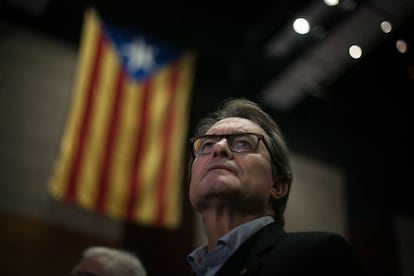Catalonia’s CDC prefers replacing leader Mas to holding new elections
Deputy Neus Munté touted as possible successor in event of a reinstatement blockage


Acting Catalan premier Artur Mas on Monday braced for a third parliamentary debate regarding his future at the helm of the regional government, which is by no means assured despite his victory at the September 27 elections.
So far, the head of the Democratic Convergence of Catalonia party (CDC) has failed to secure enough support from fellow separatist politicians to ensure a new term in office, opening the door for a new consensus figure that pundits believe could be his deputy, Neus Munté.
Also on Monday, the regional parliament began debating a motion filed by separatist forces announcing the beginning of the process to break with Spain
Although the CDC is officially sticking to its line that Mas is the only possible premier for Catalonia, and that to question this would be to endanger the entire independence process, privately there is a growing belief that Munté could be the person to break the current gridlock in the regional assembly.
Besides head-on opposition from unionist parties in the chamber – including Ciudadanos, which came in second at the election – Mas is also dealing with rejection from CUP, a small separatist party whose support is essential to an overall majority in favor of Catalan independence.
But CUP leaders campaigned on an anti-corruption platform that Mas does not embody, they feel. His CDC has been struggling with several far-reaching corruption probes, including allegations of illegal funding and corporate bribes for government contracts.
Meanwhile, party founder Jordi Pujol, once a revered figure in Catalan politics, has fallen out of grace following a confession that he kept millions in undeclared money abroad. He and his family are currently under investigation for graft.
CUP deputy Benet Salellas said on Sunday that Deputy Premier Neus Munté has the advantage of not belonging to “CDC’s neo-liberal core” and also of not being linked to corruption, “which is a lot, considering we’re talking about CDC.”
If the CUP, a fringe party that champions anti-capitalism and feminism, continues to veto Mas, the latter will have to decide whether he steps down in favor of someone else, whether he holds tight until the last vote on January 10, or whether he calls new elections in the region.
But separatists – who won a majority of seats but not of votes in September – want to avoid a new election at all costs. This suggests that CUP may ultimately at least abstain at the next vote, allowing CDC’s candidate to be instated with a simple majority.
But so far, the CDC is sticking to its theory that Artur Mas, who kick-started the independence bid five years ago, is the only person who can rally enough popular support for the separatist cause.
Also on Monday, the regional parliament began debating a motion filed by separatist forces announcing the beginning of the process to break with Spain. This motion openly calls for disobedience of Spanish institutions, particularly the Constitutional Court, if these should act against Catalan independence.
English version by Susana Urra.
Tu suscripción se está usando en otro dispositivo
¿Quieres añadir otro usuario a tu suscripción?
Si continúas leyendo en este dispositivo, no se podrá leer en el otro.
FlechaTu suscripción se está usando en otro dispositivo y solo puedes acceder a EL PAÍS desde un dispositivo a la vez.
Si quieres compartir tu cuenta, cambia tu suscripción a la modalidad Premium, así podrás añadir otro usuario. Cada uno accederá con su propia cuenta de email, lo que os permitirá personalizar vuestra experiencia en EL PAÍS.
En el caso de no saber quién está usando tu cuenta, te recomendamos cambiar tu contraseña aquí.
Si decides continuar compartiendo tu cuenta, este mensaje se mostrará en tu dispositivo y en el de la otra persona que está usando tu cuenta de forma indefinida, afectando a tu experiencia de lectura. Puedes consultar aquí los términos y condiciones de la suscripción digital.








































